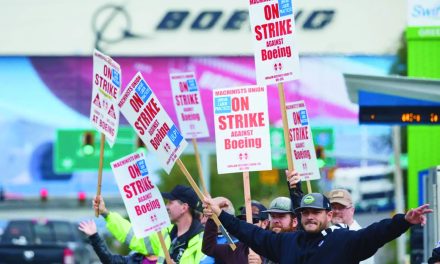“Minimize the likelihood of future union encroachment,” is a statement appears in the letter of engagement between Motor Appliance Corporation (MAC) and the union-busting firm, Sparta, a division of International Labor Relations, Inc.
The letter, which was obtained by Huffington Post through a public records request was included a July 2023 article entitled, ‘Workers Wanted a Union. Then the Mysterious Men Showed Up.’
The article, which is part of a Huffington Post series called ‘The Persuaders’ lays bare how union busters operate. This article focuses on MAC’s use of Sparta to thwart a unionization campaign where workers wanted to join the International Association of Machinists (IAM).
The article tells the story of union buster Jim Teague who used the pseudonym Jack Black to conduct his work in the field. Teague or Black has earned millions over the years by providing employers with “persuaders”— consultants who try to convince workers not to organize or join a union.
With promises to keep the union out, Teague charged MAC an upfront $5,000 retainer and a $375 per hour consulting fee. MAC would also be responsible for all expenses incurred by Sparta persuaders including airfare, travel, and meals.
Teague, who never actually went to Missouri, sent Sparta persuader Eric Grumbrecht, who, like Teague also used a pseudonym. Going by the name Aleks Green, Grumbrecht held captive audience meetings where, according to testimony from workers at an unfair labor practice hearing, he claimed a vote for the union would be a “f— you to the company.”
The union lost the election but won multiple unfair labor practice charges against the company and Sparta, including a judge’s recommendation that MAC be required to bargain in good faith with the union due to the breadth of violations.
There are hundreds of other firms like Sparta out there raking in millions to keep unions out.
Union busting is a more than $400 million a year industry, says the Economic Policy Institute (EPI). Union avoidance firms earn big money helping companies like Starbucks, Amazon, and Apple thwart union initiatives.
Amazon alone spent more than $14.2 million on them in 2022. The retail giant paid consultants about $3000 per days, plus expenses, according to Department of Labor filings.
The EPI thinks the $400 million number isn’t even close to accurate. Citing a lack of accurate data, the non-partisan think tank says much of the employer expenditures spent on union avoidance goes unreported because of loopholes that only require employers to document dealings with consultants who communicate directly with employees. That loophole allows law firms like the notorious anti-union Littler Mendelson to collect millions for anti-union activities at Starbucks which the company doesn’t have to report, because the attorneys don’t meet directly with the employees.
As Interest in Union Membership Grows, So Does the Business of Union Busting
The Labor Relations Institute (LRI), a misnomer for sure, is a business built on union busting. The company, which reportedly operates using a network of subcontractors across the country, seems to be getting more business as more workers try to unionize. According to a report from the LaborLab, a non-profit that tracks and investigates union busting, the company saw an increase in payments to its persuaders of 29 percent in 2021 and another 19 percent in 2022. Those numbers tracked with union election petitions filed by workers, says Bob Funk, who authored the LaborLab report. Funk says that many companies are hiring firms like LRI preemptively.
“We have seen a resurgence of union popularity across the US,” says Rich Kline, Union Label and Service Trades Department President. “To ensure that workers have the right to organize without interference, I believe the labor movement needs to work to pass legislation and elect politicians that will support labor law reforms. Now is the time to secure workers’ rights.”






